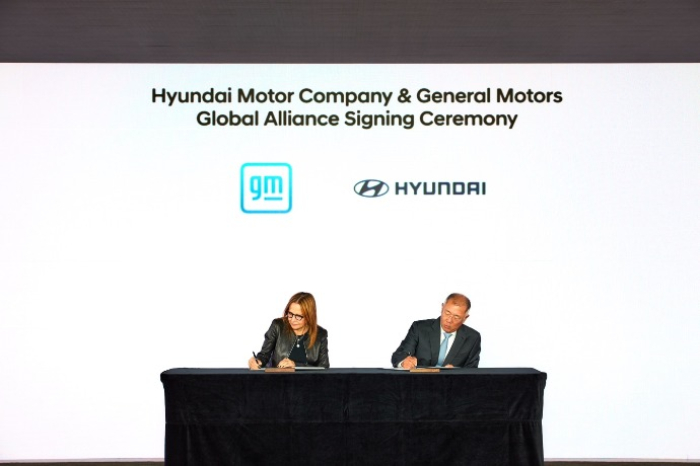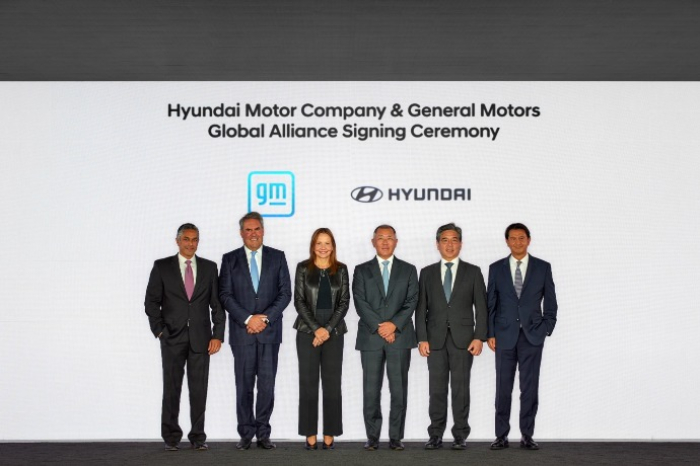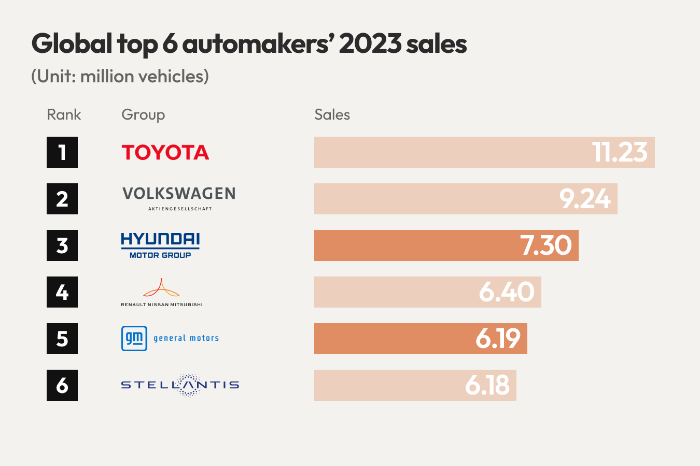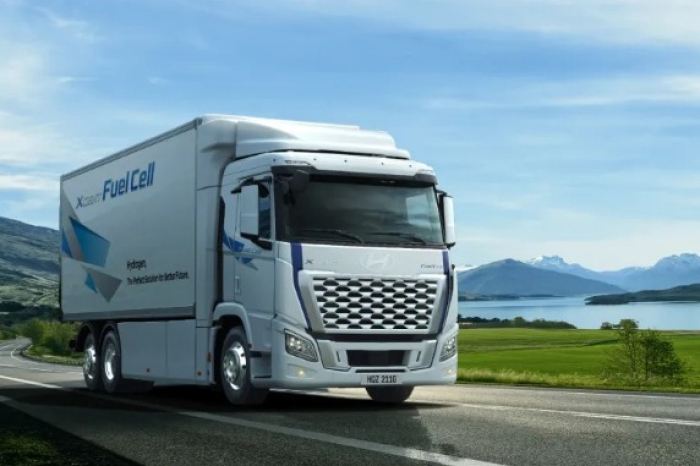Hyundai, GM deepen ties to jointly develop cars
The two global finished carmakers expect their partnership on new cars to help them cut costs
By Sep 12, 2024 (Gmt+09:00)
When in S. Korea, it’s a ritual: Foreigners make stops at CU, GS25, 7-Eleven


Maybe Happy Ending: A robot love story that rewrote Broadway playbook


NPS yet to schedule external manager selection; PE firms’ fundraising woes deepen


Seoul appeal: Korean art captivates Indonesia’s affluent connoisseurs


K-pop stocks surge as China set to loosen cultural ban after 9 years



South Korea’s auto juggernaut Hyundai Motor Co. and US auto giant General Motors Co. will explore ways to jointly develop new vehicles and source raw materials for clean-energy cars in line with efforts to ward off the ascent of Chinese rivals amid an electric vehicle market slowdown.
Hyundai Motor Group’s Executive Chairman Chung Euisun and General Motors Chair and Chief Executive Mary Barra have signed a non-binding memorandum of understanding (MOU) to form a strategic alliance, the Korean carmaker announced on Thursday.
This marks Hyundai Motor’s first strategic alliance with a global finished carmaker.
Their union could upend the order of the global auto market, auto industry observers said.
Under their agreement, Hyundai Motor and GM will cooperate on developing passenger and commercial cars, share supply chains for green car production and jointly develop electric and hydrogen fuel-cell car technologies.
"We will evaluate opportunities to enhance competitiveness in key markets and vehicle segments, as well as drive cost efficiencies and provide stronger customer value through our combined expertise and innovative technologies," said Chung.
“Our goal is to unlock the scale and creativity of both companies to deliver even more competitive vehicles to customers faster and more efficiently,” said Barra.

Through the collaboration, they are expected to lower production costs in key strategic areas while improving efficiency across the board, enabling them to better compete against rising Chinese EV makers.
CAR REBADGING
Under their agreement, they are expected to jointly develop not only internal combustion engine cars but also clean-energy, electric and hydrogen technologies.
They are also mulling car rebadging for their cars, which they will co-develop later.
Car rebadging is a widespread practice to resell another company’s car model under a new badge, mainly to save costs.
GM has 35 plants across the world. This means Hyundai Motor can produce its cars even in countries where it has no physical plants like Canada by using GM’s plants through their strategic alliance. The American car giant can also produce its cars from Hyundai Motor’s plant. This is projected to cut costs for both companies.

They will also jointly procure raw materials like batteries for EVs and general car parts such as steel to remain competitive during the EV chasm.
COMBUSTION ENGINES CARS TO HYDROGEN
Leveraging Hyundai Motor’s world’s best hydrogen fuel-cell technology, GM is expected to develop new fuel-cell cars.
Hyundai Motor started developing hydrogen motor technology in 1998 and introduced the world’s first hydrogen car model in 2013.
It rolled out the hydrogen-only model NEXO in 2018, and XCIENT fuel-cell truck in 2020.

According to the auto industry, GM is on a $65 million project sponsored by the US Energy Department to develop a mid-size fuel-cell pickup truck.
The two companies are also expected to build clean hydrogen car-producing and sales infrastructure in the US.
The union of the world's No. 3 and No. 5 carmakers is a win-win as GM is strong in the commercial vehicle, SUV and pickup truck sectors, while Hyundai Motor boasts powerful hybrid and EV lineups.
As the two partners plan to enhance their alliance in broad sectors including future mobility technologies, their union should allow them to wield even bigger influence going forward, market analysts said.
Write to Jae-Fu Kim and Jung-Eun Shin at hu@hankyung.com
Sookyung Seo edited this article.
-
 BatteriesSamsung SDI, GM to build $3.5 bn EV battery plant in US
BatteriesSamsung SDI, GM to build $3.5 bn EV battery plant in USAug 28, 2024 (Gmt+09:00)
2 Min read -
 BatteriesGM chair to visit Korea, meet LG Energy, Samsung SDI CEOs
BatteriesGM chair to visit Korea, meet LG Energy, Samsung SDI CEOsFeb 06, 2024 (Gmt+09:00)
2 Min read -
 AutomobilesHyundai Motor Group holds firm as world’s No. 3 carmaker
AutomobilesHyundai Motor Group holds firm as world’s No. 3 carmakerJan 21, 2024 (Gmt+09:00)
1 Min read -
 EarningsHyundai Motor Group units’ profits double as Chung enters 4th year
EarningsHyundai Motor Group units’ profits double as Chung enters 4th yearNov 02, 2023 (Gmt+09:00)
4 Min read -
 Hydrogen economyFleet of Hyundai XCIENT hydrogen truck exceeds 1 million km benchmark
Hydrogen economyFleet of Hyundai XCIENT hydrogen truck exceeds 1 million km benchmarkJul 02, 2021 (Gmt+09:00)
2 Min read


